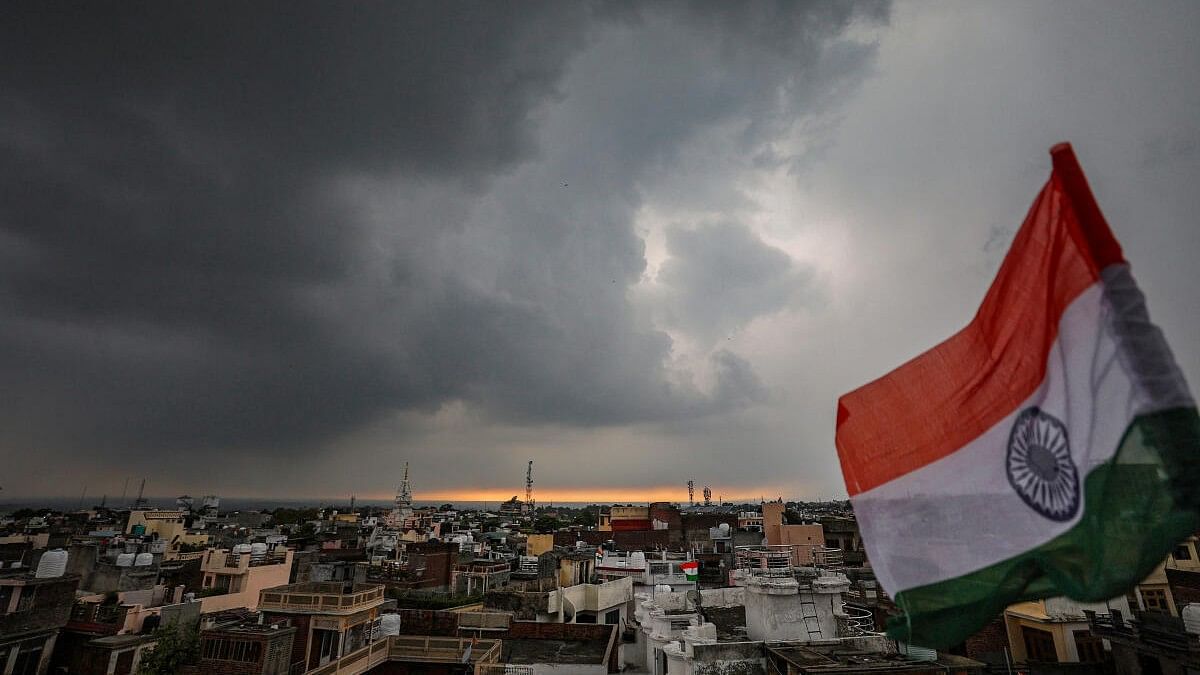
Representative image of India flag.
Credit: PTI Photo
Kashmir has been awash with the tricolour over the last few days. The Lieutenant-Governor of Jammu and Kashmir, in his Independence Day felicitations, proclaimed, “Amrit Kaal of Jammu Kashmir and a new dawn of peace and prosperity for all the citizens.”
Shah Faesal—the 2010 batch IAS officer who left the civil services in 2019, founded the J&K People’s Movement, and was reinstated into the services in 2022 by the Union government —on August 15 tweeted that “Kashmir had embraced [the tricolour] with pride”. Earlier, in July, he had tweeted that “Jhelum and Ganga have merged into the great Indian Ocean for good”.
On the obverse side is the sombre note former Chief Minister Farooq Abdullah struck when he spoke twice over in New Delhi within a week: first at the release of the report, ‘Five Years Without an Elected Administration’, of the Forum for Human Rights in Jammu and Kashmir, and, next, at the no confidence motion debate in Parliament.
Abdullah cautioned against being taken in by the usual indicators of normalcy, such as tourist footfalls; implying that even if the situation appears much improved, alienation persists, and must be addressed meaningfully.
Independence Day festivities and the return of the Ashura procession in July to the streets of Srinagar after a gap of over three decades are presented by the administration as gains stemming from the striking down of Article 370 and the centralised — double engine — administration thereafter.
There are good reasons for the Union Territory administration to project such a picture.
There is the G20 Summit coming up and the Union government is at pains to ensure that India is showcased in favourable light. At the G20 meeting on tourism in Srinagar, the security situation prevented the attendees from visiting Gulmarg and Dachigam. This needs washing down.
Alongside, the Supreme Court has fast-tracked hearings on petitions against the dilution of Article 370. Though the government in its opening salvo had pointed to the changed situation for the better, the argument did not wash on the court.
Even if claims of a meaningfully improved situation are taken at face value as true, it would be prudent to also heed Abdullah, since politicians — by nature of their calling — are meant to have a finger on the pulse of the people.
Across both regions of J&K, the consensus call is for the reversion of statehood, and the holding of elections.
While Faesal has it that ‘there is no going back’, only responsive measures can clinch his sentiment. Not taking these timely can prove yet another missed opportunity.
By the government’s own admittance — from the L-G’s touting of the indicators of normalcy at his Independence Day speech in the half-full Bakshi Stadium — the time is ripe.
The violence indices have it that the situation cannot be better. Pakistan’s proxy war is at ebb. It will remain introspective, looking to its national elections after the census results are incorporated into its electoral processes.
Thus, once the government is done with the G20 Summit, it has the panchayat elections slated. This can be taken as an opportunity to review the situation, giving it enough time through the winter to wrap up assembly elections.
Whether these would be for a state assembly is moot. Holding elections at the behest of a Supreme Court judgment will make it look chastened, particularly if the judgment forthcoming soon reverses the sequence Home Minister Amit Shah promised— statehood after assembly elections.
With constituencies long worked out, there is little reason for procrastination.
This would close the chapter of integration of Kashmir on a positive note. Having started its second tenure with Kashmir topping its agenda, wrapping it up as its stint comes to an end would be a useful plank to go into national elections soon thereafter.
It would contradict the narrative sceptical of the ruling Bharatiya Janata Party (BJP)’s perspective on Muslims. It would be of a piece with its strategic shift of an outreach to Muslims.
Not taking such a track has negative portents.
Pakistan is wracked for a second time in a decade by an Islamist backlash at a time its polity is in flux and its army is divided. The Taliban are resurgent. It is important to cauterise India from any spill over, by defusing any ‘pull factors’ that might incentivise interference from without.
Though a restive Kashmir might help with a polarisation strategy as the ruling party heads into national polls in 2024, any reversal in Kashmir in Narendra Modi’s third term (if the BJP wins the 2024 general elections) can potentially upset his ‘guarantee’ of India becoming the third largest economy.
A missed opportunity will expose the seeming normalcy as but a Potemkin village-like hype.
(Ali Ahmed is a freelance strategic analyst. Twitter: @aliahd66.)
Disclaimer: The views expressed above are the author's own. They do not necessarily reflect the views of DH.